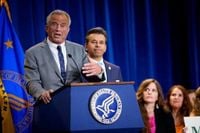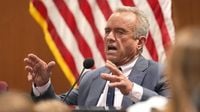Robert F. Kennedy Jr.’s health policy agenda is reshaping the American conversation about public health, food access, and vaccine innovation—and the ripple effects are being felt far beyond U.S. borders. In a matter of weeks, Kennedy’s administration has taken sweeping steps: halting nearly US$500 million in funding for mRNA vaccine research, launching a national campaign against ultraprocessed foods, and tightening restrictions on what low-income Americans can buy with government food assistance. The consequences, experts warn, could be profound and long-lasting for both the U.S. and its neighbors.
On August 5, 2025, Kennedy announced that the U.S. Department of Health and Human Services would halt funding for 22 mRNA vaccine projects, a move worth nearly half a billion dollars. According to The Canadian Press, this decision has alarmed Canadian scientists and doctors, who say the defunding will not only stall global vaccine development but also threaten Canada’s own access to vital mRNA technology. Angela Rasmussen, a virologist at the University of Saskatchewan’s Vaccine and Infectious Disease Organization, put it bluntly: “I think that Canadians do need to understand that this and a lot of the changes that Kennedy is making to vaccination policy in particular are definitely going to affect Canadians.”
Why such concern across the border? mRNA vaccines, as demonstrated during the COVID-19 pandemic, can be rapidly developed and easily modified to fight new viruses and adapt to changing strains. This agility is essential as the world braces for potential threats like the H5N1 bird flu. Rasmussen warned, “We will be delayed trying to make any vaccine should another virus emerge, including H5N1, which is one of my biggest concerns right now.” The removal of U.S. funding—long a global powerhouse for medical research—puts the entire ecosystem of vaccine development at risk.
Canadian experts are particularly worried because the U.S. is one of the largest funders of medical research in the world. Matthew Miller, Canada Research Chair in Viral Pandemics and director at McMaster University’s Michael G. DeGroote Institute for Infectious Disease Research, emphasized the safety and effectiveness of mRNA vaccines: “We have an incredible amount of real-world safety data as it pertains to mRNA vaccines. The notion that this is not an extremely safe technology, given the billions of doses of these vaccines that have been administered in the context of COVID-19, is disjointed from reality.”
But Kennedy, a longtime critic of vaccines, has justified the move by claiming—falsely, say experts—that mRNA vaccines are unsafe and ineffective. In May, he cancelled funding for Moderna’s development of an mRNA pandemic influenza vaccine. According to The Canadian Press, Kennedy’s administration has also replaced the entire Advisory Committee on Immunization Practices with individuals known for anti-vaccine advocacy, a step described by experts as a “multi-pronged attack on vaccines in general.”
Dr. Cora Constantinescu, a Calgary pediatric infectious diseases specialist, warned of a looming “vaccine confidence crisis.” She explained, “It gives more fodder to the anti-vaccine activism movement.” mRNA technology, she noted, is not only crucial for infectious disease vaccines but also holds promise in cancer treatment. The spread of disinformation, she argued, could even taint public confidence in non-mRNA vaccines—at a time when both the U.S. and Canada are battling outbreaks of vaccine-preventable diseases like measles.
Despite the upheaval, Pfizer Canada and Moderna Canada said the U.S. decision should not affect the availability of updated COVID-19 vaccines in Canada this fall. Meanwhile, the Public Health Agency of Canada reiterated the importance of maintaining domestic vaccine capacity. Currently, Canada’s pandemic influenza readiness agreements are with GSK, Sanofi, and Seqirus—but none of these involve mRNA technology. As Rasmussen pointed out, non-mRNA vaccines would take much longer to scale up for large populations if another pandemic strikes.
While Kennedy’s vaccine policies have sparked international worry, his domestic war on ultraprocessed foods is generating controversy of a different kind. On August 8, 2025, his Department of Health and Human Services released a report blaming ultraprocessed foods for a “chronic disease crisis” among children. The report, as covered by The New Republic, drew praise from researchers for highlighting the food industry’s role in poor health outcomes, even as it was criticized for including some fake citations.
Ultraprocessed foods—industrially produced items packed with processed ingredients—are linked to diabetes, obesity, and heart disease. According to the Centers for Disease Control and Prevention, more than two-thirds of calories consumed by American youth come from these foods, and they make up the majority of all calories consumed by Americans. Low-income Americans, especially those participating in the Supplemental Nutrition Assistance Program (SNAP), consume ultraprocessed foods at even higher rates.
In response, Kennedy’s administration has encouraged states to limit what SNAP benefits can purchase. As of early August, twelve states have received federal waivers to restrict SNAP funds from being used on certain ultraprocessed foods and drinks, including soft drinks, energy drinks, candy, and, in Arkansas, fruit and vegetable drinks with less than 50% natural juice. “These waivers help put real food back at the center of the program and empower states to lead the charge in protecting public health. I thank these governors who have stepped up to request waivers, and I encourage others to follow their lead. This is how we Make America Healthy Again,” Kennedy said on August 4, 2025.
The U.S. Department of Agriculture and Food and Drug Administration are now working to create a uniform federal definition for ultraprocessed foods—a task easier said than done. As Marion Nestle, professor emerita at New York University, observed, “The question is, how do you come up with a definition that casts a wide enough tent to include the major junk foods in American diets but excludes foods that really would be OK for people to eat?”
Critics worry the new restrictions could backfire on vulnerable Americans. SNAP recipients, who already face food insecurity, may struggle if their choices are further limited—especially since many lack access to the equipment or time needed to cook “real food” from scratch. Parker Wilde, a food economist at Tufts University, cautioned against conflating public health with punitive policy: “If you’re cutting benefits at the same time, that’s not paternalism, that’s harm.”
Indeed, the current political environment supporting these restrictions is described as a coalition of those skeptical of processed food and those long opposed to safety net programs. Since President Donald Trump took office, the USDA has cut programs supporting local food charities and school meals, and Congress has passed a spending law that could remove millions from SNAP.
Even as the administration’s anti-ultraprocessed food push is praised for its public health intentions, the logistics are daunting. Defining ultraprocessed foods is tricky—some “healthy” items like whole wheat bread and flavored yogurt could be unfairly swept up in restrictions. The USDA, meanwhile, has lost about 15,000 employees in recent months, complicating enforcement and oversight.
In the end, Kennedy’s health crusades—against both vaccines and junk food—are reshaping debates about science, public trust, and the role of government in safeguarding health. As the U.S. redefines its approach, the world is watching closely, wary of the consequences for global health security and the most vulnerable Americans alike.


